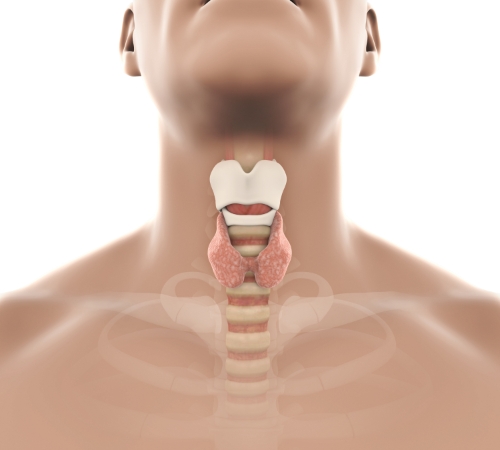Thyroid Problems

Thyroid problems can be hard to diagnose because the symptoms are similar to other conditions. Such problems can range from a small, harmless goiter (enlarged gland) that needs no treatment to life-threatening cancer.
Some common thyroid problems include
- Grave’s Disease
- Hashimoto’s Disease
- Hyperthyroidism
- Hypothyroidism
- Multinodular Goiter
- Thyroid Cancer
- Thyroiditis
- Thyroid Nodules
At Integrated ENT, our team of expert adult and pediatric physicians from multiple specialties partner with you to form a comprehensive and personalized treatment plan to address your thyroid problem.
Thyroid Gland
Your thyroid gland is one of the endocrine glands that make hormones (triiodothyronine and thyroxine) to regulate physiological functions in your body, like metabolism (heart rate, sweating, energy consumed). Other endocrine glands include the pituitary, adrenal, and parathyroid glands and specialized cells within the pancreas.
The thyroid gland is located in the middle of the lower neck, below the larynx (voice box), and wraps around the front half of the trachea (windpipe). It is shaped like a bow tie, just above the collarbones, having two halves (lobes) joined by a small tissue bar (isthmus.). You can’t always feel a normal thyroid gland.

Thyroid Disease
When the thyroid gland doesn’t supply the proper amount of hormones needed by the body, thyroid disease happens. As a result, this can cause
- Grave’s Disease
- Hashimoto’s Disease
- Hyperthyroidism
- Hypothyroidism
Grave’s Disease
Grave’s disease is an autoimmune disorder in which antibodies produced by your immune system stimulate your thyroid to produce too much T4. Grave’s disease is the most common cause of hyperthyroidism.
Hashimoto’s Disease
Hashimoto’s disease or Hashimoto’s thyroiditis is a condition in which your immune system attacks your thyroid. Inflammation from Hashimoto’s disease often leads to an underactive thyroid gland (hypothyroidism). Hashimoto’s is the most common cause of hypothyroidism.
Hyperthyroidism
This is a condition referring to an overactive thyroid where the thyroid gland produces too much of the thyroxine (T4) hormone.
Hypothyroidism
Hypothyroidism is a condition referring to an underactive thyroid where the thyroid gland does not produce enough thyroid hormones to meet the daily needs of the body.
Thyroiditis
Thyroiditis is a term that refers to the inflammation (swelling) of the thyroid gland. While there are no symptoms unique to thyroiditis, patients may experience the symptoms of hypothyroidism, which include fatigue, weight gain, constipation, dry skin, depression, and poor exercise tolerance. For other patients, they may experience symptoms of thyrotoxicosis, which are similar to hyperthyroidism.
Thyroid Growths
Multinodular Goiter
A multinodular goiter refers to an enlarged thyroid with multiple nodules. A simple goiter is an enlarged thyroid without nodules.
A multinodular goiter can either be toxic, meaning it makes too much thyroid hormone (hyperthyroidism) or non-toxic, meaning it doesn’t make too much thyroid hormone.
Thyroid Cancer
Thyroid cancer is pretty rare and patients usually have no symptoms. It is sometimes noticed first as a lump in the neck. Your doctor will remove and examine a tiny piece of the lump to determine if it is cancer or a harmless nodule.
Thyroid Nodules
Thyroid nodules are common, affecting half of all people by the age of 60. Sometimes cells grow out of control and form a lump on your thyroid. About 90 percent of all nodules are non-cancerous (benign). Your doctor can determine if a nodule is cancerous by removing and examining a tiny piece of it. If it shows cancer, the nodule will be removed.
Thyroid Tests
Thyroid disorders can be hard to diagnose because the symptoms are similar to other conditions. Patients who have thyroid problems may experience drastic changes to their weight, energy, digestion, or mood.
Thyroid tests help your doctor diagnose thyroid problems.
During your appointment, your ear, nose, and throat (ENT) doctor will ask you questions about your medical history, conduct a physical exam, and order thyroid-specific tests such as blood tests (to check thyroid function), imaging tests such as an ultrasound, CT or MRI scan, and/or fine-needle aspiration to diagnose and find the cause of your thyroid problem.
As part of the exam, one of our ENT physicians will examine your neck and ask you to lift up your chin to make your thyroid gland more prominent. You may be asked to swallow during the examination, which helps to feel the thyroid and any mass in it.
Other diagnostic tests may include:
- A fiber-optic telescope or mirror to evaluate the larynx/vocal cords
- A radioactive thyroid scan
- A chest X-ray
Thyroid Treatment
Treatment options may include medicine, radioiodine therapy, or thyroid surgery.
Depending on the nature of your condition, for example, treatment may include the following:
Hypothyroidism treatment
- Thyroid hormone replacement pills.
- Hyperthyroidism treatment.
- Medication to block the effects of excessive production of thyroid hormone.
- Radioactive iodine to destroy the thyroid gland.
- Surgical removal of the thyroid gland.
Goiter Treatment
Thyroid surgery may be required when:
- The fine needle aspiration is reported as suspicious or suggestive of cancer.
- Imaging shows that nodules have worrisome characteristics or that nodules are getting bigger.
- The trachea (windpipe) or esophagus are compressed because both lobes are very large.
Thyroid Surgery
Thyroid surgery is an operation to remove part or all of the thyroid gland. It is performed in the hospital, and general anesthesia is usually required. Typically, the operation removes the lobe of the thyroid gland containing the lump and possibly the isthmus. A frozen section (immediate microscopic reading) may be used to determine if the rest of the thyroid gland should be removed during the same surgery.
Sometimes, based on the result of the frozen section, the surgeon may decide not to remove any additional thyroid tissue, or proceed to remove the entire thyroid gland, and/or other tissue in the neck. This decision is usually made in the operating room by the surgeon, based on findings at the time of surgery. Your surgeon will discuss these options with you preoperatively.
As an alternative, your surgeon may choose to remove only one lobe and await the final pathology report before deciding if the remaining lobe needs to be removed. There also may be times when the definite microscopic answer cannot be determined until several days after surgery. If a malignancy is identified in this way, your surgeon may recommend that the remaining lobe of the thyroid be removed at a second procedure. If you have specific questions about thyroid surgery, ask your otolaryngologist to answer them in detail.
What To Expect After Thyroid Surgery
During the first 24 hours after surgery, you may have a drain (tiny piece of plastic tubing), which prevents fluid and blood from building up in the wound. This is removed after the fluid accumulation has stabilized, usually within 24 hours after surgery. Most patients are discharged later the same day or the next day.
Complications are rare but may include:
- Bleeding.
- Bleeding under the skin that rarely can cause shortness of breath requiring immediate medical evaluation.
- A hoarse voice.
- Difficulty swallowing.
- Numbness of the skin on the neck.
- Vocal cord paralysis.
- Low blood calcium.
At home, following the procedure, if it is determined that you need to take any medication, your surgeon will discuss this with you prior to your discharge.
Medications may include:
- Thyroid hormone replacement.
- Calcium and/or vitamin D replacement.
- Some symptoms may not become evident for 2 or 3 days after surgery.
If you experience any of the following, call your surgeon, or seek medical attention:
- Numbness and tingling around the lips and hands.
- Increasing pain.
- Fever.
- Swelling.
- Wound discharge.
- Shortness of breath.
If a malignancy is identified, thyroid replacement medication may be withheld for several weeks. This allows a radioactive scan to better detect any remaining microscopic thyroid tissue or spread of malignant cells to lymph nodes or other sites in the body.
Contact Us
If you have concerns about your thyroid health, contact Integrated ENT today at
(303) 706-1616 to schedule an appointment with one of our thyroid specialists. You may also request an appointment online.







